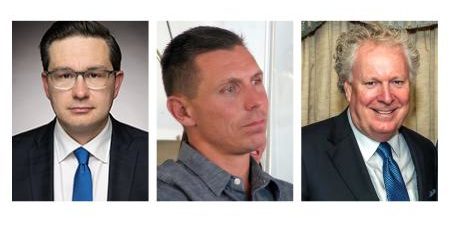I’d call this a deep dive into the top Conservative leadership contenders, except it’s unclear how deep you can dive—none have done much in life but tootle around their own party. Is that even relevant to leadership? Yes, totally.
Start with Pierre Poilievre. At 16 in Calgary, he was selling Reform party memberships. He was always a prairie, U.S.-style right-winger, never part of the historically continuous party that reached back to Sir John A. and became known as Progressive Conservatives. From Reform, they became the “Canadian Alliance,” then swallowed the old PCs whole.
He worked to make Stockwell Day leader. At 20 in second-year university, he entered an essay contest on what he’d offer as prime minister. Freedom, he proposed, still his political ID. There’s something to be said for consistency, but not that much if it never goes anywhere else. He moved to Ottawa and became an MP in 2004 at 25. He still is—an MP, that is.
From the start he was a fully formed mudslinger. There’s a pressing anger in him, like a physical need to expel bile and insults lest he explode. You can amass aggravating policy quotes but they’re not his essence; it’s his prosecutorial style in Question Period or committee hearings, visible in any of many YouTube clips: sneering at Justin Trudeau or Mark Carney, interrupting, seeking to dominate. It can be riveting.
I’d say there’s a link between this exceedingly stylized nastiness and going almost directly from student politics to Parliament. Student politics are highly idealistic; all they usually lack is a sense of life’s complexity, which you can only acquire from… living awhile. That needn’t mean abandoning the ideals, but it implies expanding how you get to them.
Jean Charest is 20 years older but similar in trajectory. He became an MP at 26 in 1984. He led the PCs starting in 1993 after they’d been decimated, then became Quebec’s Liberal leader and premier. He was booted from office in 2012 as an enemy of youth, despite his lifelong youthiness, during the Quebec tuition strike. He became one of those lawyers with a corner office in a big firm who get pointed out to clients taking the tour. He’s always seemed old before his time but he may be catching up.
Patrick Brown, born in 1978, was elected to Barrie City Council at 22, became an MP in 2006, then provincial PC leader in 2015. In 2018 he was obliterated politically by a sneak attack full of murky details, launched by his own members and staff as well as CTV. Yet within months he was back as mayor of Brampton, which was his second attempted resurrection.
Of the three, I’d say Brown comes closest to having real life experience in the sense that he was backstabbed by allies, deserted by staff and got panicked into quitting—as opposed to being a parliamentary secretary, shadow finance critic or two-time head of the PC youth federation.
Compared to this trio, Justin Trudeau seems a grizzled veteran of life’s misadventures. Born in 1971, he did a BA; floundered through some grad programs; substitute taught high school; did a eulogy for his dad which convinced me, among others, he should stay out of public life; and didn’t run for office till 2008 when he was 37. If flailing around looking for something to do and who you are counts as life experience, which it does, he stacks up well.
I’m not saying politics, broadly, should be avoided till you’ve aged. Justin’s dad, Pierre, dabbled in socialism when young, took off for “Red” China, founded a journal that helped focus the opposition to Quebec’s authoritarian government, was a law prof—and then finally fell into Liberal party politics. If he was selling out at that point, at least he knew what the alternatives were. Nothing is drearier in university days than those students who plunge straight into conventional parties without even glancing in a darker or brighter direction.
This column originally appeared in the Toronto Star.



